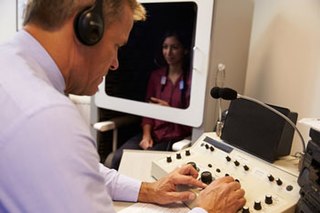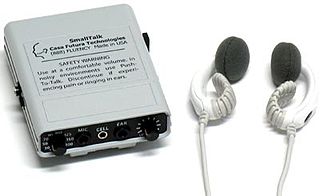Related Research Articles
Lip reading, also known as speechreading, is a technique of understanding a limited range of speech by visually interpreting the movements of the lips, face and tongue without sound. Estimates of the range of lip reading vary, with some figures as low as 30% because lip reading relies on context, language knowledge, and any residual hearing. Although lip reading is used most extensively by deaf and hard-of-hearing people, most people with normal hearing process some speech information from sight of the moving mouth.

Audiology is a branch of science that studies hearing, balance, and related disorders. Audiologists treat those with hearing loss and proactively prevent related damage. By employing various testing strategies, audiologists aim to determine whether someone has normal sensitivity to sounds. If hearing loss is identified, audiologists determine which portions of hearing are affected, to what degree, and where the lesion causing the hearing loss is found. If an audiologist determines that a hearing loss or vestibular abnormality is present, they will provide recommendations for interventions or rehabilitation.
Auditory processing disorder (APD), rarely known as King-Kopetzky syndrome, is a neurodevelopmental disorder affecting the way the brain processes sounds. Individuals with APD usually have normal structure and function of the ear, but cannot process the information they hear in the same way as others do, which leads to difficulties in recognizing and interpreting sounds, especially the sounds composing speech. It is thought that these difficulties arise from dysfunction in the central nervous system.

Electronic fluency devices are electronic devices intended to improve the fluency of persons who stutter. Most electronic fluency devices change the sound of the user's voice in his or her ear.
Marion Downs was an American audiologist and professor emerita at the University of Colorado Health Sciences Center in Denver. She pioneered universal newborn hearing screening in the early 1960s and spent over 30 years advocating for its adoption in hospitals, as well as for the provision of hearing aids to infants displaying hearing loss. Her efforts were aimed at raising awareness within the medical community about the developmental challenges associated with childhood deafness. Thanks to her initiatives, 95 percent of newborns born in America today undergo screening for hearing loss. As a result of her efforts, 95 percent of all newborns in America today are screened for hearing loss. She devoted her professional life to the promotion of early identification of hearing loss in newborns, infants, and young children and to helping deaf and hard of hearing individuals lead fulfilling lives.
Mary Florentine is a Matthews Distinguished Professor at Northeastern University specialising in psychoacoustics with interests in models of hearing, non-native speech comprehension in background noise, cross-cultural attitudes towards noise, and hearing loss prevention. Her primary collaborator is Søren Buus.
Deafness has varying definitions in cultural and medical contexts. In medical contexts, the meaning of deafness is hearing loss that precludes a person from understanding spoken language, an audiological condition. In this context it is written with a lower case d. It later came to be used in a cultural context to refer to those who primarily communicate through sign language regardless of hearing ability, often capitalized as Deaf and referred to as "big D Deaf" in speech and sign. The two definitions overlap but are not identical, as hearing loss includes cases that are not severe enough to impact spoken language comprehension, while cultural Deafness includes hearing people who use sign language, such as children of deaf adults.
Monita Chatterjee is an auditory scientist and the Director of the Auditory Prostheses & Perception Laboratory at Boys Town National Research Hospital. She investigates the basic mechanisms underlying auditory processing by cochlear implant listeners.
Larry Humes is a Distinguished Professor of Hearing Sciences at Indiana University Bloomington.
Temporal envelope (ENV) and temporal fine structure (TFS) are changes in the amplitude and frequency of sound perceived by humans over time. These temporal changes are responsible for several aspects of auditory perception, including loudness, pitch and timbre perception and spatial hearing.

Brian C.J. Moore FMedSci, FRS is an Emeritus Professor of Auditory Perception in the University of Cambridge and an Emeritus Fellow of Wolfson College, Cambridge. His research focuses on psychoacoustics, audiology, and the development and assessment of hearing aids.

Suzanne Carolyn Purdy is a New Zealand psychology academic specialising in auditory processing and hearing loss. She is currently a full professor and head of the School of Psychology at the University of Auckland.
Susan Ellis Weismer is a language and communication scientist known for her work on language development in children with specific language impairment and autism spectrum disorder (ASD). She is the Oros Family Chair and Professor of Communication Sciences and Disorders at the University of Wisconsin–Madison, where she is a Principal Investigator and Director of the Language Processes Lab. She has also served as the Associate Dean for Research, College of Letters and Sciences at the University of Wisconsin–Madison.
James Bruce Tomblin is a language and communication scientist and an expert on the epidemiology and genetics of developmental language disorders (DLD). He holds the position of Professor Emeritus of Communication Sciences and Disorders at the University of Iowa.
Sharon G. Kujawa is a clinical audiologist, Director of Audiology Research at the Massachusetts Eye and Ear Infirmary, Associate Professor of Otology and Laryngology at Harvard Medical School, and Adjunct Faculty of Harvard-MIT Health Sciences and Technology.and specialist in otolaryngology, Her specialty is the effects of noise exposure and aging on auditory function.
Janna Beth Oetting is an American researcher and speech-language pathologist specializing in the cross-dialectal study of childhood language development and developmental language disorders.

Richard Charles Dowell is an Australian audiologist, academic and researcher. He holds the Graeme Clark Chair in Audiology and Speech Science at University of Melbourne. He is a former director of Audiological Services at Royal Victorian Eye and Ear Hospital.
Judy R. Dubno is an American scientist and researcher in the field of audiology. She is a distinguished university professor and director of research in the department of otolaryngology at the Medical University of South Carolina in Charleston. She is recognized for her scientific contributions to the understanding of presbycusis, a condition of hearing loss that occurs gradually for many aging adults. She has been involved in the development and implementation of several new methods for assessing hearing loss, including the Hearing in Noise Test (HINT) and Speech Intelligibility Index (SII). She has won numerous awards for her work, including the Jerger Career Award for Research in Audiology in 2011. She served as President of the Acoustical Society of America from 2014 to 2015.
Cynthia K. Thompson is a neurolinguist and cognitive neuroscientist most known for her research on the brain and language processing and the neurobiology of language recovery in people with aphasia. She served as a member of the faculty at Northwestern University (NU) for 30 years as a Distinguished Ralph and Jean Sundin Professor in the Department of Communication Sciences and Disorders. She also directed the Aphasia and Neurolinguistics Research Laboratory (ANRL) and the Center for the Neurobiology of Language Recovery (CNLR) and is a Distinguished Ralph and Jean Sundin Professor Emerita at NU.
Laurence Baker Leonard is an American speech pathologist and linguist, recognized for his research on Specific Language Impairment (SLI) in children. As a leading scholar in this field, he has been selected to receive the biennial Callier Prize in Communication Disorders. He also holds the Rachel E. Stark Distinguished Professorship at Purdue University, where he directs research on language acquisition difficulties across different languages. Dr. Leonard's research has been funded by the National Institutes of Health for 26 years. He has authored numerous publications on the phonological, lexical, and morphosyntactic challenges faced by children with SLI, and his work has greatly influenced treatment methodologies for language impairments. Leonard earned his Ph.D. from the University of Pittsburgh in 1973.
References
- 1 2 3 "Sandra Gordon-Salant, Professor". Department of Hearing and Speech Sciences. Retrieved 13 April 2020.
- ↑ Dent, Micheal (Winter 2018). "Ask an Acoustician: Sandra Gordon-Salant" (PDF). Acoustics Today. 14 (4): 56. doi:10.1121/AT.2018.14.4.58 . Retrieved 14 April 2020.
- ↑ "Academy Honors". American Academy of Audiology. 8 May 2014. Retrieved 15 April 2020.
- ↑ "Fellows of the Society". Acoustical Society of America. Retrieved 15 April 2020.
- ↑ "Alfred K. Kawana Award for Lifetime Achievement in Publications". ASHA Wire. Retrieved 15 April 2020.
- ↑ "Honors of the Association Recipients". ASHA. Retrieved 15 April 2020.
- ↑ "Distinguished Scholar-Teacher Awards". University of Maryland, Office of Faculty Affairs. Retrieved 15 April 2020.